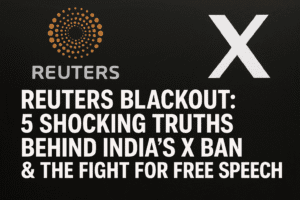Reuters Blackout: 5 Shocking Truths Behind India’s X Ban & the Fight for Free Speech
Reuters’ brief suspension on X in India starkly highlights the opaque nature of the country’s online censorship. Despite X citing compliance with an Indian legal demand as the reason for blocking Reuters’ main and World accounts, the Indian government explicitly denied issuing any such order. This contradiction underscores a critical lack of transparency: users and publishers are left in the dark about who requests takedowns, why, and what content is targeted.
The incident occurs amidst X’s ongoing legal battle challenging India’s expanding content removal powers, arguing they enable excessive government control. Blocking entire accounts of a major global news agency – even temporarily – represents a disproportionate action that severely undermines press freedom and access to information. It signals a chilling environment for all media operating in India and creates unnecessary uncertainty for markets relying on real-time news. While access was restored, the episode exposes a systemic transparency crisis in India’s internet governance, leaving fundamental questions about accountability and free expression unresolved.

Reuters Blackout: 5 Shocking Truths Behind India’s X Ban & the Fight for Free Speech
The abrupt disappearance and return of Reuters’ main Twitter/X account for Indian users this weekend wasn’t just a technical glitch – it was a stark, real-time demonstration of the opaque power dynamics governing online speech in the world’s largest democracy.
The 24-Hour Blackout: On Saturday night, users in India searching for the verified Reuters account (@Reuters), followed by over 25 million globally, found it inaccessible. A terse notice stated the account was “withheld in IN (India) in response to a legal demand.” Reuters World, another agency account, also vanished. The news organization confirmed it was working with X for reinstatement, while Indian government spokesperson explicitly stated no official block request had been issued by authorities.
X’s Compliance & The Mystery Demand: By Sunday, both accounts were restored. X’s notification to Reuters cited compliance with India’s Information Technology Act, 2000 – the same law granting officials broad powers to demand content removal on grounds like national security or public order. Crucially, X provided no details:
- Who issued the “legal demand”?
- What specific Reuters content triggered it?
- Why was the entire account blocked, rather than specific posts?
This echoes a cryptic May 16th email from X to Reuters, warning of potential withholding under the IT Act and advising contact with India’s Information & Broadcasting Ministry – whose Secretary remained silent on this incident.
A Pattern of Friction, Not an Isolated Incident: This episode is far from random:
- X vs. India’s Government: X (formerly Twitter) has a well-documented history of contesting the volume and opacity of India’s takedown orders. In March 2025, X sued the Indian government, arguing new takedown rules grant “countless” officials unchecked censorship power. That case is ongoing.
- The Transparency Gap: X’s policy states it notifies users of removal requests. However, the Reuters incident highlights a critical flaw: users (even major global news agencies) are left in the dark about who demanded action and why, making meaningful challenge nearly impossible. The government’s swift denial further muddies the waters.
- The “Account Withholding” Blunt Instrument: Blocking entire accounts, especially for established news organizations, is a disproportionate response that stifles the free flow of vital information far beyond any single disputed piece of content. It signals a chilling effect potential.
The Human Insight: Why This Matters Beyond Headlines
- Press Freedom Under Pressure: When a wire service like Reuters – a primary news source for global financial markets and policymakers – can vanish overnight in a major economy with minimal explanation, it raises profound concerns about the security of journalistic presence online. Who might be targeted next?
- Opacity as Control: The lack of transparency surrounding the demand source empowers authorities with plausible deniability while enabling overreach. It creates a system where platforms like X become de facto enforcers of ambiguous rules, caught between governments and users.
- Chilling Effect Amplified: For smaller media outlets or individual journalists, the Reuters suspension is a stark warning. If a global giant can be silenced so abruptly, self-censorship becomes a rational survival tactic, eroding public discourse.
- Investor & Market Uncertainty: For professionals relying on real-time news, such unpredictable disruptions to critical information channels inject unnecessary risk and uncertainty into decision-making within a key emerging market.
The Lingering Questions:
- Who truly initiated the “legal demand” that led to the suspension, given the government’s denial?
- Why did X choose to withhold the entire accounts rather than specific content, and why the lack of detailed communication?
- Does this incident signal an escalation in the tactics used to pressure platforms or control information flow, outside the formal channels X is actively challenging in court?
Reuters’ temporary digital exile in India is more than a resolved technical hiccup. It’s a symptom of a systemic struggle over online governance, transparency, and the fundamental right to information. The incident underscores the precarious position of news organizations operating within complex regulatory environments where accountability is elusive, and the mechanisms for control remain disturbingly opaque. The restoration of access provides relief but offers no resolution to the deeper, more troubling questions about power, accountability, and free expression in the digital Indian landscape. The ongoing legal battle between X and the Indian government will be a critical space to watch.
You must be logged in to post a comment.